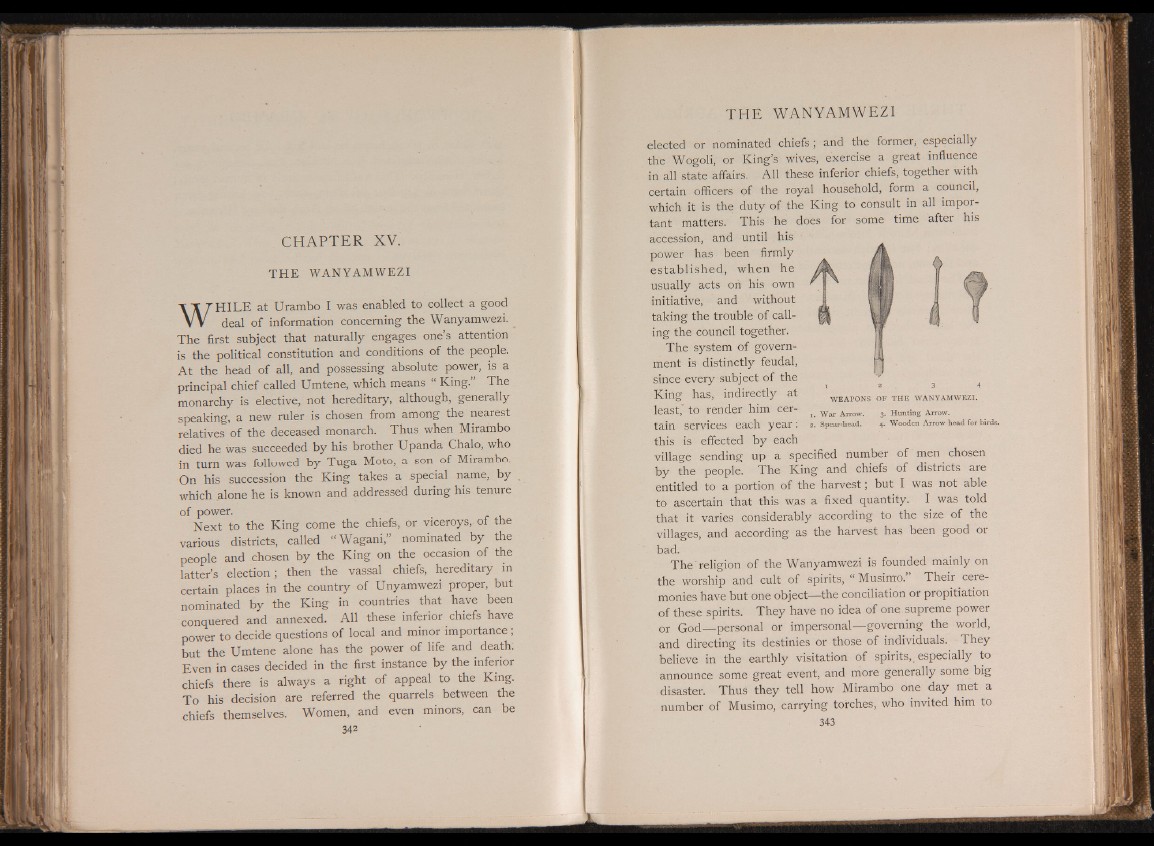
C H A P T E R XV.
TH E WANYAMWEZI
WH IL E at Urambo I was enabled to collect a good
deal of information concerning the Wanyamwezi.
The first subject that naturally engages one’s attention
is the political constitution and conditions of the people.
At the head of all, and possessing absolute power, is a
principal chief called Umtene, which means “ King. The
monarchy is elective, not hereditary, although, generally
speaking, a new ruler is chosen from among the nearest
relatives of the deceased monarch. Thus when Mirambo
died he was succeeded by his brother Upanda Chalo, who
in turn was followed by Tuga Moto, a son of Mirambo.
On his succession the King takes a special name, by
which alone he is known and addressed during his tenure
of power.
Next to the King come the chiefs, or viceroys,, of the
various districts, called “ Wagani,” nominated by the
people and chosen by the King on the occasion of the
latter’s election; then the vassal chiefs, hereditary in
certain places in the country of Unyamwezi proper, but
nominated by the King in countries that have been
conquered and annexed. All these inferior chiefs have
power to decide questions of local and minor importance;
but the Umtene alone has the power of life and death.
Even in cases decided in the first instance by the inferior
chiefs there is always a right of appeal to the King.
To his decision are referred the quarrels between the
chiefs themselves. Women, and even minors, can be
342
T H E WA N Y AMWE Z I
elected or nominated chiefs; and the former, especially
the Wogoli, or King’s wives, exercise a great influence
in all state affairs. All these inferior chiefs, together with
certain officers of the royal household, form a council,
which it is the duty of the King to consult in all important
matters. This he does for some time after his
accession, and until his
power has been firmly
established, when he
usually acts on his own
initiative, and without
taking the trouble of calling
the council together.
The system of government
is distinctly feudal,
since every subject of the
King has, indirectly at
least,' to render him certain
services each year:
this is effected by each
village sending up a specified number of men chosen
by the people. The King and chiefs of districts are
entitled to a portion of the harvest; but I was not able
to ascertain that this was a fixed quantity. I was told
that it varies considerably according to the size of the
villages, and according as the harvest has been good or
bad.
The religion of the Wanyamwezi is founded mainly on
the worship and cult of spirits, “ Musimo. Their ceremonies
have but one object—the conciliation or propitiation
of these spirits. They have no idea of one supreme power
or God—personal or impersonal—governing the world,
and directing its destinies or those of individuals.. They
believe in the earthly visitation of spirits, especially to
announce some great event, and more generally some big
disaster. Thus they tell how' Mirambo one day met a
number of Musimo, carrying torches, who invited him to
343